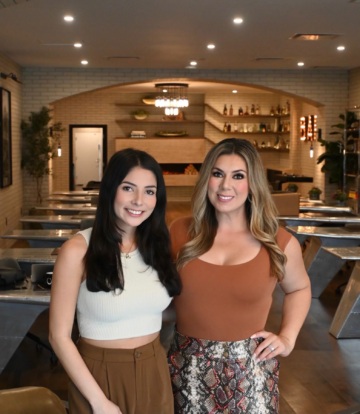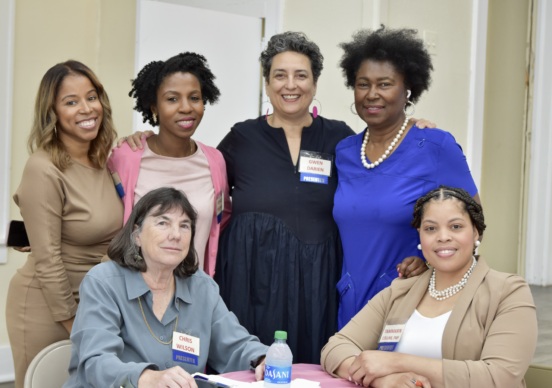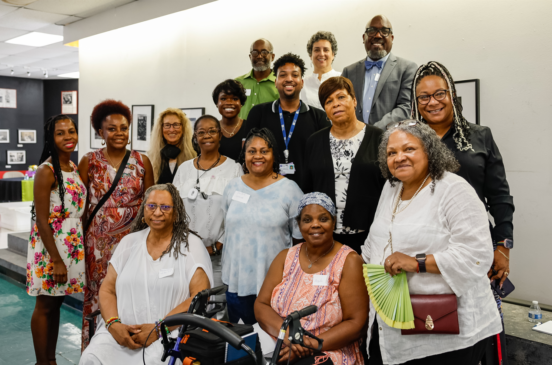Caregiving, Storytelling, Trust

Empathy is a critically important element for delivering compassionate, equitable health care.
By Christine Wilson
Isabel Wilkerson, author of Caste, gave the keynote speech at our Fall Policy Consortium, Identity and the Health Care Experience. During the event, several speakers and panelists chose the same quote from the epilogue of her book to cite in their remarks, the one that talks about the difference between empathy and radical empathy. It begins by defining what empathy is not.
“Empathy is not sympathy. Sympathy is looking across at someone and feeling sorrow, often in times of loss. Empathy is not pity. Pity is looking down from above and feeling a distant sadness for another in their misfortune. Empathy is commonly viewed as putting yourself in someone else’s shoes and imagining how you would feel. This could be seen as a start, but that is little more than role-playing, and it is not enough in the ruptured world we live in.” Caste, page 386
Empathy is one of those words, one of those concepts that we feel comfortable using and which we assume is a good thing. Having real empathy for another person, showing empathy is an indication that we care about that person and want to understand what they are facing, how they are feeling, what it might be like to be in their situation. For better or worse, we have even coined the word “empath,” to denote people who demonstrate a natural ability to “understand the feelings and perspectives of others outside of your own experience.” (Healthline).
Empathy is a critically important element for delivering compassionate, equitable health care, and the absence of empathy creates a cold, dark hole in any relationship. But as Wilkerson says, it is not enough. We need to dig deeper to understand the ways in which empathy can become a pretext for establishing and maintaining a traditional balance of power in the health care system in which the providers presume to know everything that is important and use that knowledge to make all the crucial decisions, Empathy can be a tool for preserving the implicit biases that often underlie the interactions between patients and their providers when we believe we know who another person is, what they are thinking or what their experience means to them based on the ways in which we define them. Empathy fails when it involves one person or group “looking down from above.”
As Wilkerson says, “Empathy is not sympathy.” Sympathy means feeling sorry for someone, and being glad that is not you who are suffering. Sympathy does not heal. Empathy is not knowing what someone else is experiencing or speaking for another person, especially one whose identity and experience is outside of our own.
In her book, Wilkerson proposes an alternative, radical empathy which she defines this way:
“Radical empathy, on the other hand, means putting in the work to educate yourself and to listen with a humble heart to understand another’s experience from their perspective, not as we imagine we would feel. Radical empathy is not about you and what you think you would do in a situation you have never been in and perhaps never will. It is the kindred connection from a place of deep knowing that opens your spirit to the pain of another as they perceive it.”
We tend to think of knowing as a form of control, of mastering a body of knowledge, but radical empathy really entails letting go of that concept and embracing the idea of what we do not and cannot fully grasp–another individual’s experience of the world. It means listening with that open spirit and humble heart to hear what that other person is expressing to us about that experience. Isabel Wilkerson’s definition of radical empathy comes at the end of her powerful book about what happens when we fail as human beings and as a society to form that kindred connection with people who we perceive as different, and as a result, lesser beings. In those two relatively simple paragraphs, Wilkerson tells us just about everything we need to know to begin to find that place of deep knowing that can make all the difference.
Caregiving, Storytelling, Trust
Equity, Policy Consortium
Equity, Palliative Care
Equity, Health Literacy, Insurance, Policy Consortium



